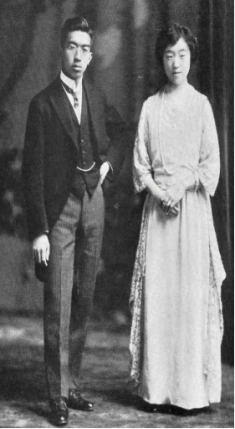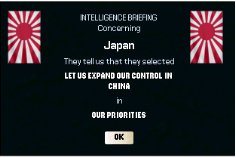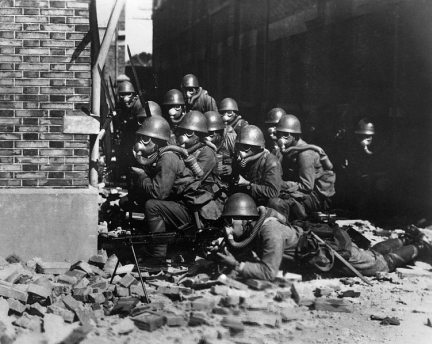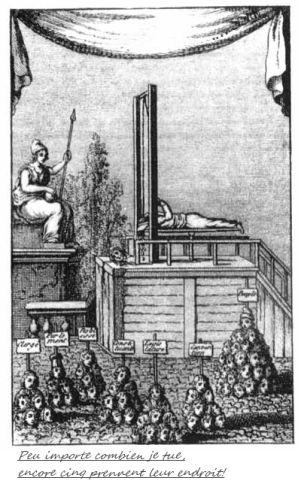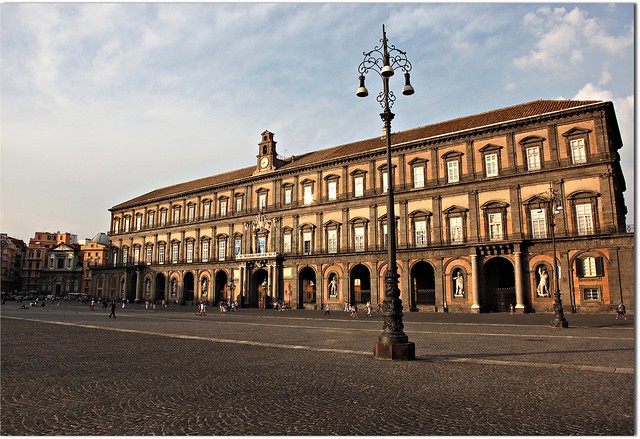"More mercenary groups?" Jan Krause heard the little boy ask his mother as they marched on past. Krause smiled at the little boy and handed him a lollipop. Brave lad, that one. Most of the people just slunk away when his group walked past, but this one came up to them bold as you please and dragged his mother alongside him.
The Cantonese really hated them here, Krause knew, but he didn't hate them. Well, most of them anyways. There were always the local girls in the cities and villages who knew how to give a man a good time, but he didn't like how they gave his men issues that lingered for years. And the intellectuals, the nationalist ones anyways, were always preaching how mercenaries like him were stripping the fat from the land and burning it all down. Which was shit, of course. Krause knew that without mercenaries the AOG would disappear in a month.
Sure, every once in a while an armed European group would go rouge and set up their own little kingdom somewhere in China, but usually the local warlords would make a deal or slaughter them and they wouldn't be much of an issue anymore. And anyways, wasn't this all supposed to be a big Empire by now? The 'new Chinese Empire', or whatever the Japanese were calling it? Absurd men, those Japanese. Krause looked forward to facing them in battle.
Krause took out a small 'Donitz' pamphlet that he found in a fallen comrade's pocket and began reading it. A lot of the boys only came here after the Austrian Invasion and there was not a one of them who cared for the the Hapsburgs. Line after line of graphic descriptions of the horrors of Austrianism, Catholicism, and Papism made him smile; he'd become somewhat immune to propaganda during his time in the AOG.
A commotion up ahead drew his interest. Feeling uneasy, Krause began hustling over, but a sharp shock of pain tore though his leg. He fell to the ground and looked at his foot in shock; he'd been shot, not once but twice. "Damn mines" he swore as he crawled over to cover. His men reacted to the attack just as they had been trained to. They located the enemy, fixed them with superior firepower, and cleared the objective with a secondary team.
Long after the battle was over, long after Krause saw the faces of one of his dead friends, a small boy arrived at the mercenaries' camp and handed him a message. Reading it with one hand focused on keeping the bandages covering his leg intact, Krause looked back at the boy, pulled out a gun, and shot him in the head. Krause looked at this rest of his men, sighed, and knew today was the day he died.
"They are coming."
The Conference of Beijing
It would be difficult to find a country in the first half of the 20th century that played its hand better than Japan. In 1900 it was little more than a prestigious Asian country, considered backwards and barbaric by the civilized states in the West. By 1949 it was a roaring dragon, conquering island after island and city after city. Its economy had grown substantially due to the imports it received from its puppets in China and elsewhere, and its alliances kept it from being isolated internationally. The Emperor Hirohito had at his command the largest navy in the world and an island that suffered from neither Syndicalist unrest nor Republican fervor.
The Emperor Hirohito and the Empress Kojun had spent much of the twentieth century as effective pawns of the military. In the 1930s and 40s the Emperor was able to use his immense popularity- which boarded on outright deification- and the military intra-personal conflicts to become one of the most significant players in Japanese politics.
This might seem obvious in retrospect, but Japan's strength in 1949 was significantly overstated by many analysts of the era. China remained a hotbed of sectarianism and nationalism, and the mass majority of the Japanese forces there were in a constant struggle with the partisans in the region. Warlords dominated much of Japanese controlled China, and their allegiance to Tokyo was fragile at the best of times. To the south of the Fengtian Republic was the AOG, which had against all odds achieved a form of independence from its corporate masters in Berlin, Vienna, and Petrograd. Tokyo feared that one strong push by revolutionaries would topple the AOG's government and unleash a whirlwind that would destroy everything the Japanese had worked for.

Japan has gone to war twice with China in the past fifteen years. The first conflict was against the Fengtian Republic, which had declared independence while Japan was busy fighting Korean and Taiwanese Independence movements. The second was the outright conquest of the Qing, a conflict which is typically considered part of the Third World War since Japan only felt confident enough to attack the Chinese when Beijing's ally, Germany, was under attack by Austria and France. Many in Tokyo fear that their allies in China might one day again be bold enough to demand independence.
To the north and the west was Russia and her allies, constantly alert for signs of weakness in the Empire. Russia's commercial contacts in the AOG and its alliance with the warlords of the Yun'an Clique made outright support of Chinese nationalists unlikely, but Petrograd never backed away from its claim on Vladivostok. The Black Baron himself, Pyotr Wrangel, gave a speech during the height of the Invasion of France calling for reunification with Transamur, which was something that was utterly unacceptable to both the Emperor and the leader of Transamur, Gregory Semyonov.

The White Army General Gregory Semyonov became convinced that Kolchack's dictatorial measures were the only thing that could save Russia from both Leninist traitors and German imperialism. After Kolchak's administration retreated to the Transamur, Semyonov was declared a traitor by Alexander Kerensky. Kerensky desperately needed German industrial and military support to defeat the Communists, and saw anti-German nationalists as an existential threat. After a democratic revolution toppled Kolchack from power Tokyo forced Transamur to reinstall a military government with Semyonov as the head of the government. Semyonov's rule was weak; his own people longed for independence from Japan and either a return to the Russian Empire or the creation of a democratic Republic, and Kolchack remained in Transamur with the backing of a large section of the Transamur military.
Japan's industrial base was the smallest of the four powers, and many intellectuals stated publicly that their naval superiority would not last long now that the world was mostly at peace. Most immediately the leaked documents from the Commonwealth Forum proved beyond the shadow of a doubt that the British wished to once again control all of India. Though not a mortal threat, many in Japan feared a revived British Empire would once again meddle in the affairs of Asia. The chief of the Japanese Foreign Ministry, Toko Hideki, hastily called for their own alliance's conference to deal with the crisis.
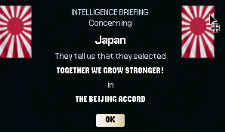
The first issue brought up during the convention was what should be the Co-Prosperity Sphere's chief foreign objective in the upcoming years. After considering trying to take the rest of Europe's islands in the region (including, shockingly, Australasia) and trying to unite Indochina under Thai control, Japan and her allies in the Fengtian Republic convinced the other delegates that all of their futures lay in a supportive and unified China.
Let the bodies hit the floor.
By early 1949 it had become obvious that Russia and Austria were in danger of stretching their limited resources too thin. In early February Austria finally put down the most flagrant terrorism of the early White Terror, while Petrograd's inability to capture the Baltic Duke after Russia had annexed the country humiliated the Tsar and brought international scorn on Russia's intelligence service. Hirohito and his top military adviser, Tojo Hideki, felt that they would never be offered a greater chance to finish their conquest of China.
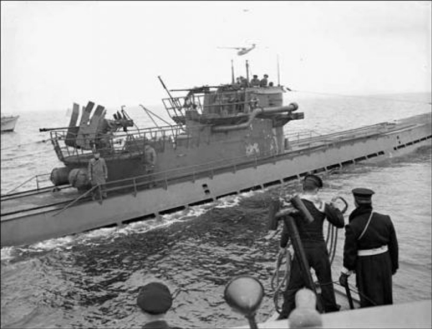
The escape of the Baltic Duke Adolf Friedrich I to Finland was one of the more romantic and exciting events of 1949. The Duke was smuggled out of a heavily armed Russian military camp onto a Finnish submarine. They somehow transported around the ice sheets, avoided a Russian marine that was specifically looking to stop the Duke's escape via submarine, and successfully landed on the southern shores of Finland. To this day no one is sure how exactly the Great Escape occurred, though that hasn't stopped Napoli from producing dozens of well-regarded films on the subject. The Baltic citizens for their part saw this as a sign that God was on their side in the struggle, and a legend was born that the Duke would return to the Baltics when the land was purged of sin.
To help succeed in this goal, the Japanese reached out to their old friends in Holland. While Hirohito prided himself on his anti-imperialist rhetoric, the Dutch had through trade and diplomacy slowly found themselves to be the only Europeans trusted on the Islands. This strategy had worked wonders; just a few months before in late 1948 the Japanese helped the Dutch capture and execute several French and native Syndicalist spies operating in Indonesia. The Japanese wanted to utilize the economic capabilities and raw resources of Indonesia, and the Dutch were more than happy to accept a partnership into the Co-Prosperity Sphere on behalf of their financially-troubled colony.
To be clear this is not an alliance. Dutch Indonesia is now involved in the economic side of the Co-Prosperity Sphere, not the military side.
The Dutch East Indies were troubled colonies, its inhabitants still furious by the joint Japanese-Dutch crackdown on suspected Syndicalists. Dutch politicians debated whether or not to make Indonesia a proper federal state or an autonomous region while nationalists clashed with colonial police.
This agreement would have long lasting consequences. Hata Shunroku, head of Hirohito's air force, utilized a loophole in the Treaty of the Eastern Air Forces that allowed him to send planes to spy on Delhi, Burma, and the Russian-aligned warlords. Though the Dutch had little to do with this, their coming conflict with Russian backed Indonesian nationalists would be in large part because of Japan's abuse of Dutch airfields. Shunroku was, coincidentally, something of a colleague of mine; when I wrote a book discussing the continued political dominance of the
Shizoku-Samurai in Japan I corresponded with Shunroku who was one of the leaders of the hierarchical class. His tactic of using overwhelming air power to bomb enemy armies and cities into oblivion became a major reason why the man was latter assassinated by the Yun'an Clique.
The warlords of China held de-jure power over much of China during the first half of the 20th century. By 1949 many of them had either allied with or been destroyed by the Japanese, but several were able to escape with some of their men to the Yun'an Clique, a Russian-aligned military junta that welcomed Chinese dissidents and warlords into its ever growing ranks. The brutal tactics of many of these warlords' armed forces and their constant fighting in the territory controlled by the Clique gave rise to the belief that the nation was a body "where the lungs are in a permanent state of war with each other".
China in 1949. Nine powers are in the region, and every major alliance is heavily involved.
The final act of the Beijing Conference was the most monumental. Tojo announced that the Emperor and his wife had made a surprise visit to the city which caused the entire conference to rise to their feet. The Emperor had not visited China for seven long years, and his presence in Beijing was seen as giving a great honour to the city. Minutes latter Hirohito, standing next to his entire cabinet, announced the birth of the Luan Dynasty. Emperor Kung Te-cheng would be the first ruler of the Chinese Empire reborn.
Kung Te-cheng, Holy Duke of Yen and a 77th generation descendant of the great philosopher Confucius, was taught by his father and mother (shown above) to be a patriot above all else. Though Kung Te-cheng was not enamored with the Japanese, he feared that without Tokyo's support China would never be free of foreigners and barbarians. He would latter call his acceptance of the throne a 'necessary deal with the island ghosts'.
As the delegates roared their approval, the people of the city celebrated the end of Republican and xenophilic rule, as Zhang Xueliang, leader of the Fengtian Republic, was known to openly sympathize with foreigners and Christianity. The celebrations spiraled into violence as the southern Han began attacking known Republicans in the capital.
The riots in the foreign sections of the city were particularly fierce. The republican Han, the Manchus, and the foreigners found themselves banding together to face the ferocity of the southerners, an alliance which deeply unnerved the Japanese.
The new Chinese Empire's claim to be the legitimate ruler of all of China was seen internationally as the aggressive and militaristic statement it was. The feudal theocracy of Tibet drew closer to its supporters in Moscow, an action that endangered its relations with its southern Entente-supporting neighbors. Mongolia's reactionary far right populist government declared that as the successor of the Yuan Dynasty its emperor was the rightful Emperor of all China. Tsar Vladimir Romanov must have been amused when he found out that his Mongolian puppets announced him the rightful heir to the Chinese Imperial Throne, but his refusal to accept the title was seen as 'pragmatic' and that 'this action once and for all proves the great Tsar's dedication to peace'.
The New Imperial Times, New York, March 1949
The Yun'an Cliques response was far more violent. Within days a massive force of multiple warlords collectively began raiding neighboring territories. The warlord's threat only ended during the Butchering in Xi'an. The start of the battle saw the warlords' force encircling and cutting down multiple units of the Chinese Empire. Without an army to defend them the citizens of the city fled
en masse and found themselves being literally cut to pieces by horsemen. Entire city blocks were burnt to the ground, and the local banks and treasuries were overrun. This story has something of a happy ending. Had the warlords simply destroyed the enemy and fled they would have avoided vengeance. For after two days of heavy fighting Japanese divisions began to arrive. The warlords' armies, untrained and unready to deal with professional soldiers, were quickly eradicated.
The Japanese commander during the battle of Xi'an, Prince Kan'in Kotohito, was a strong proponent of gas warfare. The warlords' forces were unable to successfully respond to such a tactic and many of their affected troops were easily picked off by elite soldiers specifically trained to fight in such conditions. Coincidentally, the battle also is credited with unearthing the Terricota Warriors after an explosion uncovered some in a nearby field.
The proclamation started a crisis for the AOG. The corporate giant was, technically, subordinate to the Chinese Emperor. The AOG had always acknowledged Puyi as the rightful Emperor, something that continued even after the Japanese conquest of the Qing Empire. The AOG was forced to decide between the Emperor living in Xiamen and the Emperor ruling in Beijing. The arguments between the factions that supported appeasing the extremely powerful Japanese and declaring their own rival Emperor (the 'anti-Emperor', as impish Papal wags called Puyi) became increasingly bitter. Both sides recognized that if Puyi was given power that it would be effectively a declaration of independence, something the company had refused to do even though foreign oversight of its activities had ceased to exist.

John Rabe, leader of the faction supporting Puyi. Rabe had spent a lot of time helping deepen economic and social ties between the people of southern and northern China. He was banned from entering northern China by the provisional government after he personally stopped Japanese troops from preforming 'anti-partisan activities' in Nanjing and other cities.
In Japan itself the news was met with mixed emotions. Many trusted and believed in Hirohito implicitly, and refused to question his actions. Others were angered that the title given was 'Emperor', which theoretically put him on the same social latter as their own Emperor. Any many were concerned that a united China would once again threaten to break free of Japanese dominance.
A Syndicalist poster mocking the growing number of Emperors in the world.
Hirohito was not unaware of the threat a united China posed. In order to keep the Chinese Emperor from achieving a state of military power that could threaten the Japanese army, Tokyo split off the western provinces and created a new Western Kingdom under the Ming pretender Zhu Rongji, a man hated by his people due to his support of the Shangqing. The Western King would in theory answer to the Emperor in China, but the Japanese created the kingdom's constitution to have crucial, irreconcilable difference with the constitution of the Chinese Empire, difference that Tokyo hoped would keep them locked in acrimony and reliant upon Japan. In time Japan hoped to create a southern kingdom, a northern kingdom, and a kingdom based around Chengdu.
The Western Kingdom's constitution gives only limited influence to the Western King and real power to the Japanese 'advisers'.
As the conference wound to a close, troubling reports from overseas had begun to reach Japanese ears. Yemen had descended into chaos as its hated leader, commonly called 'al-Djinn', attempted to abolish the painfully limited democratic reforms enacted in the past decade. An anti-Axis pact had been signed by forces in the Levant with the intent of kicking Egypt out of the region. Soldier protests in Africa had brought the forces of the Eighth Coalition in a state of near panic. The mysterious
Guo Zhen (who would become a flee in the Japanese' porridge) had released a manifesto denouncing royal authority over China regardless of whether the leader was Manchu or Han. Most ominously Otto von Hapsburb, in reaction to the Commonwealth Forum and the Beijing Conference, formally usurped the mantle of responsibility from the Kaiser and declared Mittleuropa reborn.


